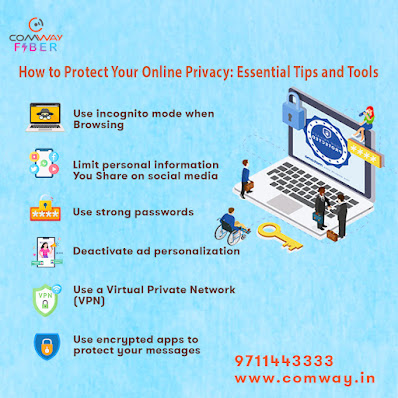How to Protect Your Online Privacy: Essential Tips and Tools | Comway
In today's digital world, protecting your online privacy is more important than ever. From personal information to browsing habits, your online activities can be vulnerable to data breaches and surveillance. In this blog post, we will explore essential tips and tools to help safeguard your online privacy and ensure your personal information remains secure.
Use Strong and Unique Passwords
Creating strong, unique passwords for each online account is crucial. Utilize a combination of letters, numbers, and special characters. Consider using a password manager like LastPass or Dash lane to securely store and generate passwords, ensuring you don't reuse them across multiple platforms.
Enable Two-Factor Authentication (2FA)
Adding an extra layer of security with 2FA significantly enhances your online privacy. Enable 2FA for your email accounts, social media profiles, and other sensitive platforms. Services like Google Authenticator or Authy provide a secure way to verify your identity through your mobile device.
Protect Your Personal Information
Be cautious when sharing personal information online. Avoid providing unnecessary details on social media profiles or public forums. Review privacy settings on social media platforms and limit the information visible to the public. Consider using a pseudonym instead of your real name whenever possible.
Utilize a Virtual Private Network (VPN) A VPN encrypts your internet connection, shielding your online activities from prying eyes. It masks your IP address and provides a secure connection, especially when using public Wi-Fi networks. Trusted VPN providers like NordVPN or ExpressVPN offer reliable encryption and protect your privacy while browsing the internet.
Browse Securely with HTTPS
Ensure secure browsing by looking for the "https://" prefix in website URLs. The "s" indicates that the connection is encrypted, providing an added layer of protection. Install browser extensions like HTTPS Everywhere, which automatically redirect you to the encrypted version of websites.
Regularly Update Your Software
Keeping your operating system, antivirus software, and other applications up to date is essential for maintaining online privacy. Software updates often include security patches that address vulnerabilities. Enable automatic updates whenever possible or regularly check for updates manually to ensure you have the latest protections.
Consider using privacy-focused browsers like Mozilla Firefox or Brave, which prioritize user privacy and offer built-in features like tracking protection and ad-blocking. These browsers limit data collection and provide enhanced privacy controls, helping to safeguard your online activities.
Be Wary of Phishing Attempts
Phishing emails and fraudulent websites can trick you into revealing sensitive information. Be cautious of unsolicited emails, suspicious links, or requests for personal details. Verify the authenticity of websites and email senders before sharing any sensitive information.
Clear Your Digital Footprint Regularly clear your browsing history, cookies, and cache to minimize the amount of data stored on your devices. Use browser extensions like Privacy Badger or Clear URLs to block tracking cookies and remove unnecessary tracking elements from URLs, further protecting your online privacy.
Educate Yourself and Stay Informed
Stay updated on the latest privacy practices and trends. Follow reputable cybersecurity blogs and news sources to educate yourself about emerging threats and privacy-enhancing tools. By staying informed, you can proactively protect your online privacy and make informed decisions about your digital footprint.
Conclusion
Protecting your online privacy requires a combination of proactive measures and utilizing privacy-enhancing tools. By implementing strong passwords, enabling 2FA, utilizing VPNs, and staying informed about privacy best practices, you can safeguard your personal information and enjoy a more secure online experience

.png)
.png)

Comments
Post a Comment